Last year at the United Nations, President Donald Trump stirred fears of a nuclear conflict by taunting North Korean leader Kim Jong Un as “Rocket Man … on a suicide mission.”
This year, no such verbal pyrotechnics. On Tuesday at the same venue, Trump did, though, light into plenty of other targets, including Iran’s murderous regime, OPEC’s price gougers, the International Criminal Court, Venezuela’s failed socialists, allies who don’t pull their weight, China’s role in the unfair world trade system and nations that expect a foreign aid handout from the U.S. while despising American values.
That is, Trump thumped for his “America First” agenda, telling the General Assembly: “We reject the ideology of globalism and embrace the doctrine of patriotism.”
On this, he has plenty of company among his fellow Americans. And if you frame every issue as America First lest it be America The Victim — of unfair trade, unfair world defense expectations — then it’s no surprise that Americans will embrace a less than robust U.S. role in global affairs.
But the country with the world’s most powerful military and the world’s biggest economy can’t safely ignore … the rest of the world.
We’re not advocating intervening, militarily or otherwise, in all manner of conflicts across the globe; those should be judged case by case.
That said, when America retreats from the world, it forfeits much leverage to export freedom, democracy, human rights and free markets. A blinkered America leaves a dangerous void to be filled by thugs like Russian President Vladimir Putin, who poisons former spies and angles to disrupt American elections, and Iran’s supreme leader, Ayatollah Ali Khamenei, who bankrolls terror across the globe.
Yes, it’s smart to sort friends from enemies — and reward or punish them accordingly. The U.S. should focus resources to protect American security and interests. Example: Trump rightly boasts that the U.S., with help from allies, essentially drove Islamic State terrorists from Iraq and Syria. But battling terrorism is a global joint venture that ultimately requires those regional allies, more than the U.S., to prevail.
Similarly, we’ve backed Trump’s call for NATO allies to contribute more to their own, and Europe’s, defense. But we don’t share Trump’s doubts about why NATO should exist in the first place. Just look to Russia, greedily eyeing its former Soviet satellites, and you know why.
American leverage, judiciously applied, can produce results. For instance: Trump’s taunt of Kim last year was a useful disruption of the long-standing status quo. Challenging Kim yielded a summit and some tentative progress on ridding the peninsula of nukes. The world is not now safe from North Korean aggression, as Trump has boasted. For that to happen, Trump will need major help from China, South Korea and Japan. But the disruption did focus the world on Pyongyang’s growing nuclear heft.
Another example: Iran. In May, Trump abandoned the U.S.-led 2015 nuclear pact with Iran, provoking hand-wringing among Europeans who feared an imminent conflict with the Islamic Republic (and a massive loss of business opportunities). So far, however, the result is impressive. Most of the world’s major businesses have chosen a side — the largest, most reliable economy in the world, the U.S. — over the pipsqueak Iran. Iran’s economy is crumbling as its oil exports dive. Unemployment in Iran is staggeringly high. Citizens protest in the streets, a potentially lethal activity in the oppressive regime.
Will Trump’s tough stance on Iran yield a new deal — or a growing nuclear threat in the Middle East? Stay tuned: Some of the strongest economic sanctions against Iran kick in on Nov. 5. They could further devastate Iran’s economy and put public pressure on its regime.
If only Trump would recognize these tentative successes in dealing with North Korea and Iran as reasons why America shouldn’t only look inward. America First works better as a populist slogan than as an effective foreign policy. To achieve the latter, the U.S. has to engage. Selectively, yes. But to advance security, human rights and democracy, often.
Editorial by the Chicago Tribune
Visit the Chicago Tribune at www.chicagotribune.com
Distributed by Tribune Content Agency, LLC.
Send questions/comments to the editors.



Success. Please wait for the page to reload. If the page does not reload within 5 seconds, please refresh the page.
Enter your email and password to access comments.
Hi, to comment on stories you must . This profile is in addition to your subscription and website login.
Already have a commenting profile? .
Invalid username/password.
Please check your email to confirm and complete your registration.
Only subscribers are eligible to post comments. Please subscribe or login first for digital access. Here’s why.
Use the form below to reset your password. When you've submitted your account email, we will send an email with a reset code.